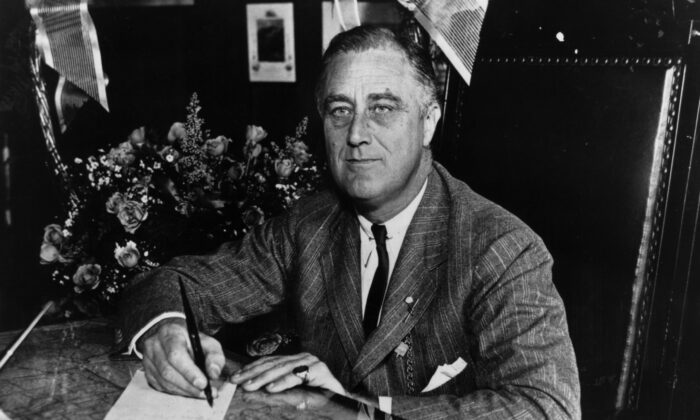
1936: Franklin Delano Roosevelt (1882 – 1945) the 32nd President of the United States from 1933-45. A Democrat, he led his country through the depression of the 1930’s and World War II, and was elected for an unprecedented fourth term of office in 1944. (Photo by Keystone Features/Getty Images)
Raid on Small-Town Paper Recalls FDR’s Harassment
By David T. Beito – September 27, 2023
A mid-August (2023) police raid of the Marion County Record, a small, family-owned weekly newspaper in Marion, Kansas (population 1,922), ignited justified outrage among First Amendment advocates and civil libertarians across the U.S.
During the raid, local police, using the dubious pretext of identity theft, seized computers, cellphones and other equipment belonging to the paper—which, perhaps unsurprisingly, had been critical of the police.
While Americans expect this kind of behavior in places such as China, Cuba and Russia, we’re always shocked when it happens here. We’re especially shocked when the culprit is usually considered a resolute defender of freedom.
Eight decades ago, one such defender of freedom—or, at least, a resolute opponent of Nazism—President Franklin D. Roosevelt, unleashed his Justice Department on another small-town, family-owned newspaper, the Boise Valley Herald in Middleton, Idaho, (population 477 in 1940). Many in the Roosevelt administration disliked the paper because of its unflinching criticism of FDR’s foreign policy, his complicity in racial discrimination, and his civil-liberties abuses.
Like the Marion County Record, the Herald featured such routine fare as births, deaths and weddings. The publisher, Adelbert Cornell, who had Quaker-inspired pacifist beliefs, described himself as a “daylight farmer and lamplight editor.”
But in 1942, the Herald faced a challenge that threatened to destroy it. Postmaster General Frank Walker, relying on a letter from Attorney General Francis Biddle, branded the paper’s content “seditious” and pulled its low-cost, second-class mailing privileges. Congress had granted the low rates to newspapers in 1792 because of the press’s important contribution to the public good. This was no small matter for a shoe-string publication such as the Herald.
The government’s case was flimsy. It did not even imply a conscious attempt to aid the enemy or advocate illegal acts. Instead, the charge of sedition centered on editorial opinions, such as claims that the U.S. embargo on Japan had helped provoke the Pearl Harbor attack, that income-tax withholding imposed an onerous burden on the poor, and that wartime mobilization was suppressing “individuality.”
The government also deemed as seditious several of the paper’s articles opposing government discrimination against Japanese Americans. One, for example, had accused the FBI of “pulling a typical Nazi stunt in this section of Idaho in the form and manner of raiding and searching the homes of every Japanese resident within many miles of Caldwell.”
The Cornells fought back by personally delivering copies locally and sending papers in sealed envelopes without return addresses to out-of-towners. Adelbert Cornell hoped to reprint all of the offending material in a pamphlet, suggesting half-seriously that it “might be valuable to writers who wish to avoid the pains and penalties of the law, as a handbook of forms of what ‘not’ to write for publication.” The postmaster general finally lifted the restrictions in 1944, but warned the Cornells to tone it down. They ignored him.
The fallout from the Herald affair produced almost no national media coverage, though two prominent Idaho dailies, one of them reliably supportive of FDR’s foreign policy, expressed solidarity on First Amendment grounds. Shortly before an ACLU-recruited lawyer appeared before the Post Office Department Board, he was privately warned: “Apparently, the boys in Justice are dead set against the newspaper even though it is a relatively unimportant one.”
Attorney General Biddle may have felt special disdain for the Herald because it was not an ordinary pacifist publication. The Cornells, instead of confining themselves to purely symbolic gestures, such as appealing for more conscientious-objector exemptions, pushed an aggressive political agenda. They advocated a negotiated peace and stressed the underside of wartime mobilization and New Deal “regimentation.”
The pages reprinted articles by such Civil Rights champions as Bayard Rustin and highlighted disparate racial treatment in criminal justice. That the Cornells were not just armchair crusaders might have sharpened the government’s animus. Two of Adelbert Cornell’s sons had gone to jail for refusing to register for the peacetime draft in 1940.
The experience of the Boise Valley Herald some 82 years ago underlines the importance of protecting free speech and freedom of the press. It also illustrates how governments, when given the chance, often seek to quash criticism.
The Herald’s “David versus Goliath” showdown with the Roosevelt administration also stands as a timely lesson in how a charge of sedition—like today’s charges of racism, sexism, ableism and all the other forbidden isms—can easily be abused because of its open-ended and malleable nature.
DAVID T. BEITO is a Research Fellow at the Independent Institute, Professor Emeritus at the University of Alabama, and author of The New Deal’s War on the Bill of Rights: The Untold Story of FDR’s Concentration Camps, Censorship, and Mass Surveillance.
